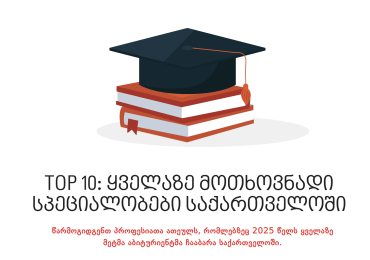Eco-Clean, Eco-Friendly, Sophisticated Infrastructure, Convenient Housing, Modern Business Environment, Best Location, Industrial Park–these are the colorful descriptives used in recent reports to describe Anaklia, the ‘City of the Future’. Former Deputy Minister of Economy and Sustainable Development of Georgia Ketevan Bochorishviliis now the Executive Director of Anaklia City. At the time of her interview with Forbes Woman, Bochorishvili was in the midst of handing over her old responsibilities and taking up new ones. That is probably why she speaks with equal enthusiasm about the projects carried out at the ministry, the plans for Anaklia, as well as the role of women in today’s Georgia.
During her seven-year tenure as the head of the Investment Agency and Deputy Minister of Economy, she led numerous reforms aimed at the development of the private sector, multi-million foreign investments, and innovative projects supporting business, export and tourism development. She took part in drafting land-use and development regulations and organized a number of events that were of global importance. Bochorishvili and her team initiated and implemented several large-scale projects, including ‘Produce in Georgia’, ‘Host in Georgia’ and ‘Film in Georgia’. Her portfolio includes the development of micro enterprises and investment projects, supporting the export of Georgian wine and a host of other products. Bochorishvili believes that it is crucial to have quality investment in the country, investment that creates added value, ushers in new knowledge and technology –the kind of investment that promotes a research-based decision-making culture, high standards of corporate management, as well as open and transparent management systems. Only then can business and investment bring long-term benefits to the country. The correct investment is a key resource that can promote education, expertise and the development of the sector.
“Attracting investment requires purposeful geographic and sectoral diversification. We should not focus on a single country or a single sector. Obviously, there are leading countries and popular spheres in terms of capital investment in Georgia. However, it is equally important not to overlook anything that promotes the economic stability of the country and lays the foundation for sustainable economic development. During these seven years, I have probably met thousands of people and attended hundreds of events with the purpose of demonstrating the competitive environment and the potential that Georgia has to offer.”
A well-planned investment policy, along with calculated and purposeful activities can make any sector attractive for investors. This is exactly how it worked for the transportation and communication sectors, as well as the construction and enterprise industry and the financial sector.
Due to the right policies, a country that underwent myriad of crises just a short while ago, has managed to revive several sectors that are strategically important for the economic development of the country – for instance, the energy sector. In the wake of the major energy crisis, this sector has turned into one of the fastest- growing investment markets in Georgia. There are currently several major foreign energy companies operating in the country and most importantly, the introduction and development of green energy possibilities are already being considered.
Any project Bochorishvili embarks on, whether it is the attraction of investment or the development of the domestic market, she tries to adjust it to the new surroundings. She is convinced that in order to make an accurate assessment of a project and analyze what went right and what went wrong, the estimated length of the project must be at least 2-3 years. Even in cases where the project enjoyed a high level of success, one cannot afford to sit back and relax – things change quickly in the business world and one has to keep abreast of these changes. The state policy must be tailored to the needs of the private sector:
“You can never say that everything is absolutely perfect. The business development mechanisms, culture and demands change so fast that I cannot see how approaches from 10 years ago can still be applicable today without thoroughly adjusting them. The government of Georgia constantly strives to keep abreast of these changing demands. I believe that the current investment climate in our country is very favorable and equally important is the fact that Georgia has a shown a tendency towards economic growth. We don’t have the same investment or business history as most European countries, despite the fact that Georgia is gradually emerging on the world map as a dynamically developing country that implements reforms, has positive business ratings and most importantly, enjoys enviable free trade regimes with Europe, China and other countries…”
Bochorishvili often refers to the map, probably because at some point, everything comes down to whether or not you are on the world map or not, and if so, what position do you hold there? What do they know about Georgia? We not only expect them to bring finances, but also technology and knowledge.
First, we need to make sure that investors are fully informed about Georgia. The next step obviously is to bring them in. Bochorishvili says that the route that precedes this process is long and arduous. Some companies open trial offices in several countries. A prime example is the company Lactalis. After discovering that the company had success in Georgia, Lactalis closed all its other offices and started expanding in Georgia. The French dairy giant then became one of the largest shareholders in the Georgian company Sante, thus bringing Georgian dairy products to the global marketplace.
After Georgia signed the Deep and Comprehensive Free Trade Agreement (DCFTA) with the European Union, operating on the Georgian market became very advantageous and convenient for many companies. Several European companies decided to base their primary operations in Georgia, including the Austrian beverage company Rauch, and Zooplus, the leading German supplier of pet food and pet accessories.
However, one of the main challenges remains the lack of job opportunities. The sector that creates jobs faster than any other sector is the textile industry. For several years, Georgia was waging a targeted campaign in Turkey, Germany and other leading European states. According to Bochorishvili, the campaign yielded good results and several international brands started producing designer apparel in Georgia. Today, Georgia manufactures for brands like Zara, Massimo Dutti, Moncler, Puma, Adidas, Nike and many others.
“I would like to draw your attention to one particular enterprise that is currently under construction. It’s a textile factory in the town Poti that is expected to create 4, 000 new jobs over the next two years and will manufacture apparel for world-renowned brands.”
In conjunction with a strong investment policy, it is also crucial to support local businesses. This has been a major challenge in recent years. So, Bochorishvili and her economic team came up with the idea of creating the Entrepreneurship Development Agency (currently ‘Produce in Georgia’, a state-funded NNLE) that was launched in the summer of 2014. Before developing institutional reform, they became acquainted with the experiences of other countries and analyzed how Ireland, Sweden, Czech Republic, and both the Baltic States and Balkan states launched similar entrepreneurship supporting organizations. The second stage was to adjust all of this data to the specificities of Georgia. They interviewed hundreds of entrepreneurs in order to identify the challenges they were facing. Finally, they settled on the use of specific financial support instruments in combination with technical and marketing backing. For three consecutive years, thousands of small, medium and large entrepreneurs benefited from various financial support mechanisms, such as low-interest credits and grants, advantageous leasing schemes and participatory grant-making.
“There was too much arguing as to ‘why banks’? Because banks are often reluctant to lend money and so on … our goal was to make sure that the newly opened businesses did not close the next day and turned into sustainable, competitive and commercially profitable businesses. Only banks have the required knowledge and experience to determine this. The following has been accomplished in cooperation with banks since 2014.To date, over 300 companies have been founded or redeployed; investments worth more than half a billion have been mobilized and 11,300 new jobs have been created. Some received funding in 2014 and are already operating. Others are in still in the construction process and are expected to open by the end of this year or next. Tax refund amounts were worth twice as much as the money issued by the state. For example, approximately 15 companies received co-financing from the state totalling ₾7 million and over the next two years they received a₾14 million refund.’’
‘Host in Georgia’ is another successful mechanism for supporting business growth, which is aimed to assist in the development of hotel infrastructure in various regions of Georgia. Twenty-three hotels have opened within the framework of this project:
“To cite the words of former Secretary-General of the World Tourism Organization, TalebRifai hotels are like ‘smokeless plants’ that are particularly needed in the mountainous regions, where the development of tourism leads to the advancement of other sectors as well. It is a chain reaction.”
The active engagement of companies, the development of new sectors and the creation of new jobs within a short periodis a clear demonstration that all these projects are highly appreciated by local entrepreneurs. For instance, the company Geo Cap was established a year ago with the support of the Produce in Georgia program and it is the first company in the Caucasian region to produce plastic corks and bottles. This enterprise has taken over 70% of the market and is planning to export its products abroad. It should be noted that Produce in Georgia has been recognized as one of the most successful business supporting programs by the Organization for Economic Co-operation and Development (OECD).Today Georgia is actively cooperating with Azerbaijan, Belarus and Ukraine, since these countries seek to introduce similar programs.
Bochorishvili believes that Georgian companies must go through internationalization, as it is important to focus on export and the diversification of markets. The promotion of exports is one the directions she is actively working on now.
“How is this done? Let us use the example of wine. Our team set the goal of diversifying Georgia’s alcoholic beverages export market. We picked the Chinese market with its growing demand for alcoholic beverages. We drafted a strategic plan for one year and within the frames of this plan, we managed to attract the attention of the target importers. We also organized the most prestigious international wine exhibitions in China and Hong-Kong, and arranged for the participation of leading winemakers in various competitions. We took advantage of all state forums and events held in Asia in order to promote Georgian wine through locally recognized professionals operating in this field. The competitions turned out to be very successful. Georgian wine was the Grand Prix winner in several competitions and received numerous awards. As a result, we moved up in the prestigious international rating of winemaking countries and managed to attract Asian interest in our products for the first time. We responded promptly by inviting approximately 80 carefully selected Asian importers and members of the wine media, including the most prominent Asian wine master, and organized a meeting with forty Georgian winemakers. All of these efforts helped strengthen our contacts and close business deals, while Asian wine journals were loaded with photos of wine barrels and drinking horns. None of this would have worked if we had left out even one component. Fortunately, the government of Georgia, along with the private and non-governmental sector, carried on with this campaign in a very coordinated and successful manner, and China is now one of Georgia’s top three export markets for Georgian wine.”
Georgia’s lack of a qualified workforce remains a big challenge for the country. However, this challenge can easily be overcome by the establishment of various state-supported vocational colleges, training programs and professional retraining centers. In an effort to tackle this problem, the state launched a special training program for export managers. Another essential component of the state-funded program Produce in Georgia was its support of micro and small enterprises – it too was preceded by a training program. The medium and large enterprise support program is being implemented with the active engagement of the banks. The participatory grants in this component are also provided by the state. With regard to the actual implementation and technical assistance, this is provided by non-governmental organizations.
“The state cannot afford the luxury of giving out money to inexperienced people. Starting a business in Georgia is very simple. However, sustaining and developing that business is a challenge. The British Petroleum developed this component based on the social corporate responsibility model. I personally met with the beneficiaries of this program in various regions, worked with the management of the company and shared the best practices of the private sector with public sector representatives. This is a rare precedent even on a world scale. At the beginning, we put together business ideas from all around the country. Ina period of a year and a half, we received40, 000 application from various regions of Georgia. We picked the ones with the most potential and then trained almost 10,000 people on various themes in order to help them turn their ideas into business projects. A total of 5,000 entrepreneurs received funding. One of the conditions was that the entrepreneurs had to invest 20% of their own money and only after that would the state issue co-financing grants. The state carries out constant monitoring and at the moment, 99% of the beneficiary companies are still operating and expanding.”
As for micro-entrepreneurs, from today’s perspective, they think that the training they received in the first stage of the project proved to be much more important than the funding itself. They want to see this process continued. Bochorishvili is a firm believer in the ‘contagion effect’ and thinks that success is contagious.
“It’s like when a child grows up in a familywatching what her parents do and then learns from them.As a rule, micro-entrepreneurship is a family business. When neighbors see how it develops, they also want to do something new. This micro entrepreneurship-supporting project may not have an instant effect on the economy of the country, but it will encourage the emergence of a new generation that will have entrepreneurial skills. These projects may yield tangible results in 3-5 years. You cannot just have 100 million enterprises right away. This process takes time.”
Bochorishvili notes that one project does not suit everyone. Every project has its own target group. It is important that these projects ensure good quality, are results-oriented and cover every sector of the economy that requires support. The state support policy must incorporatelarge, medium and small businesses, as well as investors and local manufacturers. However, this cannot be done by means of a single mechanism; the approach needs to be individual: this must be a transparent process that is equally accessible to everyone. It is important to highlight and encourage success stories.
‘Film in Georgia’ is another initiative that aims to establish anhonorary place on the world map. The ultimate goal of the project is to get the world’s film industry interested in Georgia and to convince filmmakers that filming in Georgia is interesting and convenient in many ways. Georgia has already hosted representatives from Asian, European and US film markets. Several films have already been shot here and there are ongoing negotiations regarding some new films to be shot in Georgia. On the one hand, this project supports the development of the film industry and creates new job opportunities; while on the other hand, it promotes the popularity of the country and attracts more tourists. The fashion industry-supporting program serves the same purposes.
“Almost all spheres are linked to the film industry. Shooting a film means functioning hotels and food-serving establishments, as well as increased demand for service. It also requires the participation of logistical, textile and maintenance companies. The budget of a single movie may be as much as $1 million USD and you can just imagine the effects that this amount of money may have on the economy of the country. Moreover, if a movie shot in Georgia turns out to be successful, we will get an invaluable advertisement as a reward. Countries such as New Zealand, Ireland, Iceland, Czech Republic and Hungary gained huge popularity, and a growing flow of tourists due to the films that were shot in these countries. These included ‘The Lord of the Rings’, ‘Brave Heart’, ‘Game of Thrones’ and so on. World-renowned magazines like Vogue, Elle and others write about the fashion weeks hosted by Georgia. Everything requires packaging and sending it to the right addressee, whether it is wine with its ancient history and unique varieties, Georgia’s various cheeses, honey and so on.”
Bochorishvili’s first trip abroad was in 1997-1998 through the ‘Future Leaders Exchange Program’ (FLEX). She says that America was a turning point in her life where she first realized the value of a good education and the effect it can have on a person. For several years she was the chair of the FLEX alumni association and says that it was a place where some very ‘insane ideas’ used to originate. The fact that the majority of the association members are now successful businesspersons and public servants makes her very happy. She believes that the opportunity to study and live abroad is invaluable. Your homeland becomes even more precious for you upon return and the experience helps you see its true potential more clearly. She is well aware of the benefits that equal access to education and career development can have. She says that even though on the legislative level men and women enjoy equal rights, the old stereotypes and perceptions remain a big challenge. She believes that it is extremely important to overcome these stereotypes and that people who hold leading positions in the government can contribute to this process by assessing candidates for various positions based on their professionalism and skills, rather than their gender. She is cognizant of the fact that it is hard for women to take their rightful place in society and the effort it requires. Education, jobs, discipline, career aspirations and success are all achievable for both women and men if they enjoy equal conditions. Bochorishvili was still a student when she started working at the British Council. Later she received her master’s degree at Bocconi University and for some time worked for a consulting company in Italy. After that, she worked at ‘Millennium Challenge – Georgia’ and then the National Investment Agency of Georgia. She never considered becoming a public servant until the former Minister of Economy Vera Kobulia offered her the position of the Head of the Investment Agency. She took the job because presenting Georgia, promoting her country in the United States and later in Italy was always her job, and now she was presented with an opportunity to do even more in this regard. She is going back to the private sector for the same reasons. She believes that Anaklia City can completely transform the investment and business environment in Georgia:
“I have never linked my work with politics. The most important thing for me was to have the opportunity to do my job. It is one thing to possess the skills, it’s another thing to be able to use these skills. I always had the support of my supervisors and they gave me a chance to turn my ideas into successful projects. None of this would have worked without their great efforts and mentorship in this project. Prime Minister Giorgi Kvirikashvili has made a huge contribution by channeling efforts into the right direction and supporting the implementation of projects that are crucially important for the country. Equally important was the contribution of the Vice-Premier Dimitri Kumsishvili. We implemented several very interesting projects together. I have lots of work awaiting me in my new position, since it is a long-term, multi-component, large-scale project. My experience from public service sector will sure come in handy – attracting investment, supporting the private sector, the development of industries, and spatial arrangement and planning. This is not just a joint project of the TBC Group and the Conti Group (Anaklia City), this is Georgia’s project. I am excited and a bit nervous in a good way – this is a big challenge. Nevertheless, I know that everything will work out just the way it should. A special economic zone will be arranged along the deep-water port, which means that our neighborhood policy, strategic vision and transit options must all be applied. This must become a global corridor. Embarking on such an ambitious project presents Georgia in an entirely new way on the world map.”
At 36, Bochorishvili already has 18 years of work experience. She says that even though she may owe some of her success to luck, everything she achieved was well deserved. Every step that she took was preceded by a previous job and experience and this continues to this day. There were many setbacks along the way, but she never gave up. She has never left the job at 6 p.m., because ‘the working hours are over and I can wrap it up’ is not simply her style.
She never worked just for the sake of having a job, nor only for the salary since it was her only source of income. She was doing her job because it was interesting. There were hard times too, but she knew she had to keep on moving and her family supported her all along the way. She always financed her education in the US, Italy and Georgia herself. She either received a scholarship or worked to save money for her education.
At no time did she say that she was finished with her studies. She went to various summer schools, and participated in training courses and workshops –even during holidays. She says that her next career step is very consistent with her personality – she is craving new challenges, new projects and that is why she made the decision to move to Anaklia City.
“I can count on one hand my days off during the past seven years. Nonetheless, this was my choice. I always crave to do more, to rush things, to have more energy, to run, to change and develop. Seven days are never enough for me in one week, one month needs to have more than four weeks and every day I need an extra one or two hours to get things done –this is my routine,my way of life …”
Hashtags:
#investingeorgia #produceingeorgia #tradewithgeorgia #filmingeorgia #hostingeorgia #traveltogeorgia #visitgeorgia #skigeorgia #skionsilk #8000vintages #creadleofwine #madeingeorgia #georigandesigners #weargeorgian #anakliacity
















